A scientific exploration of the winner of the decade, continued.
June 24, 2020 by Patrick Stegemoeller in Opinion with 0 comments
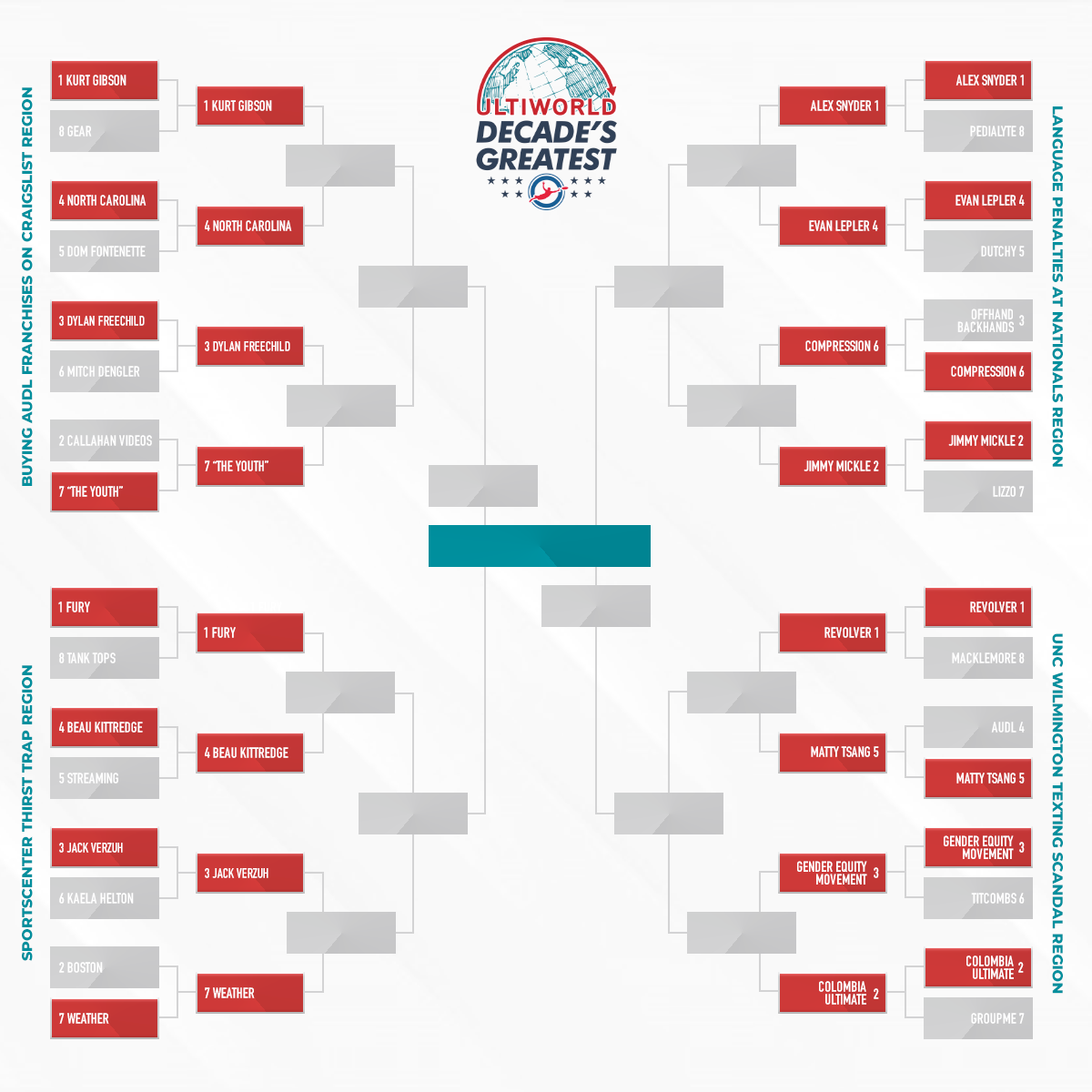
Ultiworld’s “Decade’s Greatest” series is presented by Greatest Bag. Get the greatest bag in ultimate at GreatestBag.com!
Who won the decade? It’s a complex and nuanced question, but with the pseudoscience of bracketology, we can arrive at an answer.
If you missed Part 1 of this endeavor, make sure you go back and check that out to understand how we got here and, more importantly, what ‘winning’ the decade means.
Once again, the results of each matchup in this bracket are determined by a very intricate algorithm that is much too complex to explain. The important thing to remember is that it’s not me arbitrarily deciding who wins each matchup; it is the notion of pure truth flowing through me, following gravity’s rainbow to an unimpeachable result. Trust me, the results are final and deeply meaningful.
Alright, let’s get on with the round of 16 and the quarterfinals in the second part of this three-part series.
Round 2
UNC Wilmington Texting Scandal Region
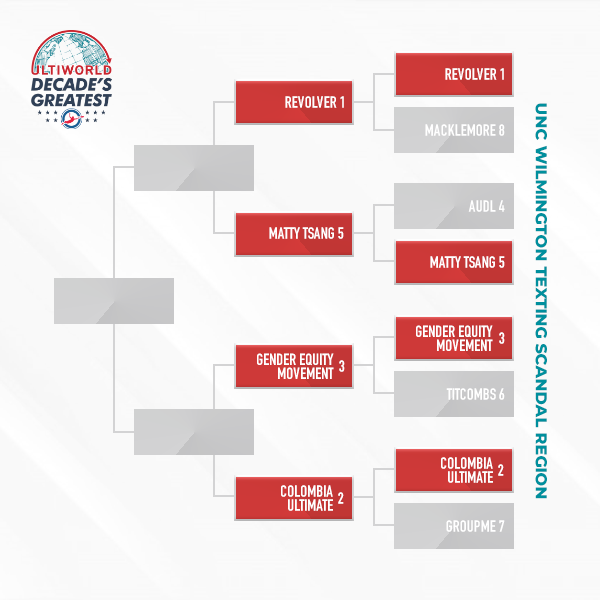
Two razor-thin matchups here in the UNC Wilmington Texting Scandal Regional semifinals. In one contest we have two titans who each found their own way to define winning, and in the other we have two emergent forces that spent the decade grabbing the spotlight from entrenched powers.
#1 Revolver vs. #5 Matty Tsang
Revolver cultivated an aura of invincibility with a combination of IHD1 quasi-mysticism, Beau Kittredge, and side stack. Matty Tsang got closer to actual invincibility at a domestic level, winning three titles with Fury, leaving for a couple years, then coming back and winning two more. It’s not irrelevant that Tsang coming back in 2017 is the same year Fury got back into the winner’s circle, cementing themselves as the team of the decade in the women’s division with two late titles.
In terms of total championships this decade, Revolver has five club titles, three WUCC titles, and the WUGC title as team USA in 2012. Meanwhile, Tsang also has five club titles to go along with one each from WUCC, WUGC, and two World Games titles. That knots it up at nine apiece. The tie-breaker? On both of the World Games teams that Tsang coached, there were Revolver players, so they get a little bit of credit for those gold medals. It’s harsh, but I don’t make the rules, I just follow them.
Winner: Revolver
#2 Colombia Ultimate vs. #3 Gender Equity Movement
On the other end of the region, two pre-tournament favorites meet in just the second round. More evidence that life is nasty, brutish, and short. You could easily see one of these nouns winning the whole thing but tragically one of them will pull a Riot and not even make it to semis.
Colombia Ultimate has pushed the envelope for what teams, players, and coaches can achieve outside of the American hegemony. Medellín Revolution’s triumph at the 2017 U.S. Open may have been the moment that Colombian ultimate truly arrived on a big stage,2 but the declaration of intent goes all the way back to the start of the decade.
At WJUC in 2010, the Colombia girls team with Laura Ospina and Elizabeth Mosquera upset the US and Canada to claim gold in spite of the economic and historical barriers facing teams outside of the sport’s traditional hotspots. The Colombia girls defended the crown in 2012 with the Cardenas twins — who must have been like 8 years old at the time — on board and Mauricio Moore in the picture as coach. That core would grow into the Revolution team that has become one of the best clubs in the world, notching wins against virtually every major US squad before winning silver at the 2018 WUCC and the 2019 PUL title.
While the Colombian men’s teams have not had the same success as their counterparts, they have emerged as a viable rival to Canada, Japan, Australia, and everyone else chasing the US. Plus, the combined team at the World Games in 2017 was the only one to beat the US in that competition this decade, sending waves of panic around US ultimate before the Americans re-established the status quo in a gold medal rematch. Colombia hasn’t dethroned the US as the premier frisbee nation, and honestly are not all that close to doing so, but just proving that gods can bleed is a big win.
The Gender Equity Movement has had less tangible success, but unprecedented levels of intangible influence on the sport. It is the lens through which almost every single conversation about the sport now must be viewed through. The actual on-paper wins — things like transitioning the community from “man” to “person” defense, increased visibility from media, and the creation of the PUL/WUL — are less influential than the foundational ways the ethic of the sport and what it means to participate in the ultimate community has transformed over the course of the decade. Simply put, the Gender Equity Movement has undertaken the monumental task of changing how we consume, think about, and participate in ultimate.
It cannot be overstated how seismic this work is. The gender equity movement has framed ultimate as a platform for contesting several of the deeply entrenched inequalities that are bedrock to society writ large, and having successfully done so for what is essentially a bunch of goofballs chasing plastic around the world is an achievement. The movement has made participation in the sport at virtually any level a political act, and what it means to be a part of the ultimate community in 2020 is fundamentally different than it was in 2010 because of gender equity advocacy.
But this bracket is about, if anything, “winning.” And the challenges that face the Gender Equity Movement in terms of tangible gains are still quite large. The inequities rife within society are still there. USAU participation is still 67% male. The mixed division is still a lot of toxic dude ball.
“Winning” as a concept is largely about boiling the intangibile down to the tangible. How good someone is at ultimate in the abstract is intangible. How many points that translates to on a scoreboard and winning is how that abstract becomes concrete. Colombia Ultimate’s success this decade was more tangible, and in a contest of who “won” more, that becomes the deciding factor.
Winner: Colombia Ultimate
Language Penalties at Nationals Region
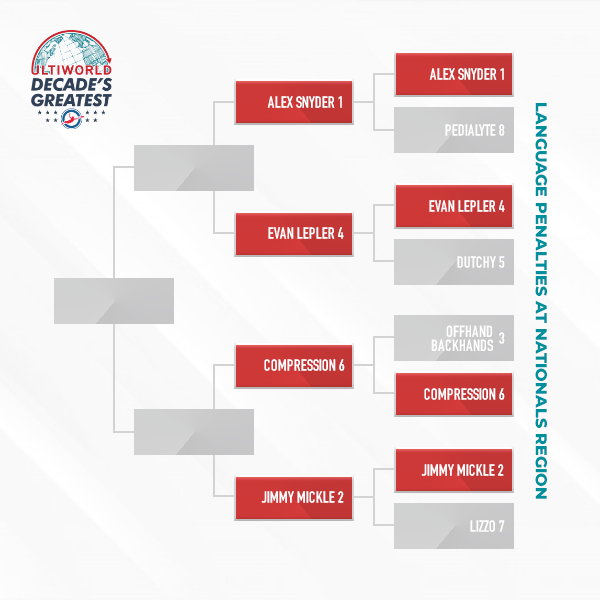
#1 Alex Snyder vs. #4 Evan Lepler
You hear about athletes across disciplines who seem like they are playing a different game from everyone else on the field. The other 21 guys are playing soccer, Leo Messi is engaging in some multi-dimensional ritual with the ball that occasionally results in a change on the scoreboard. This is what it was like watching Alex Snyder conquer the wind in Sarasota. Everyone else was playing windy ultimate — no-backhand marks, huck-and-set, freak out whenever you’re on the trap sideline, etc. — while Snyder moved the disc like she was just tossing around in a peaceful meadow. It was one of the most impressive things I saw in ultimate this or any decade.
Evan Lepler may have increased his standing more than any other human in the ultimate community during the 2010s. Nobody went out and Got. That. Bread., and all it entails, harder than the Lep Dog. But while his rise was prayer-hands-emoji inspirational content, Snyder maintained a level of excellence that is largely unmatched in the history of the sport. She moves on.
Winner: Alex Snyder
#2 Jimmy Mickle vs. #6 Compression
Compression makes fake athletes like me look and feel more like a real athlete. Jimmy Mickle is one of the few players in the sport who is a real athlete. Enough said.
Winner: Jimmy Mickle
SportsCenter Thirst Trap Region
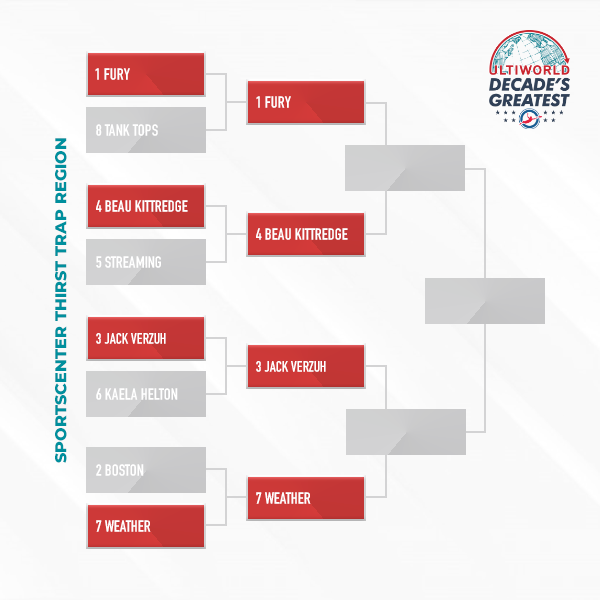
#1 Fury vs. #4 Beau Kittredge
“Like, Beau wouldn’t have made it in the NFL but he didn’t have to, and you don’t have to do the equivalent, you just have to want something specific enough.”
That’s it. That’s the entirety of Beau Kittredge and frisbee and life all at once. Very Important Twitter personality Mags Colvett texted me that one day and nothing since has explained the myth of Beau better. He told himself that he was going to be the best at something — something stupid and futile to be sure, but a thing none the less — and he did it. He trained, he practiced, he tweeted like a chad about training and practicing. And he became the most dominant frisbee player alive. He jumped over the men’s division in the first third of the decade, ran past them in the middle years, and then fought off father time to win two more club championships, an AUDL chip, and a World Games gold down the backstretch. Have you ever had an idea to do something, and then done it? It’s a staggeringly difficult thing to do.
Fury are unfuckwithable to be sure. They have five club titles and achieved a level of success where it didn’t matter who was on the roster, they were still Fury, and you never worried about Fury because they’re Fury. That’s some dynasty shit. But Beau made a new thing exist. Maybe a dumb thing, but he molded the clay of his life into a… something… that was paid $50,000 to play frisbee, which isn’t a thing that should exist. He may not echo into eternity when the grand counting of professional athletes is done, but in this little pond, he became a new, horrifying, captivating big fish. A loathsome, offensive brute. But I can’t look away.
Winner: Beau Kittredge
#3 Jack Verzuh vs. #7 Weather
Maybe if they had been in the spotlight for all ten years of the decade Jack Verzuh could triumph over the very force of nature. That’s how good they’ve been. It bears repeating, Verzuh is the best college ultimate player ever. Of all time. The number one person. But without a club title or a World Games roster spot, there is still some winning to be done in the new decade for Verzuh.
Weather meanwhile was able to peak at college, club, youth, and international levels — basically anywhere and everywhere the sport is played.
Winner: Weather
Buying AUDL Franchises on Craigslist Region
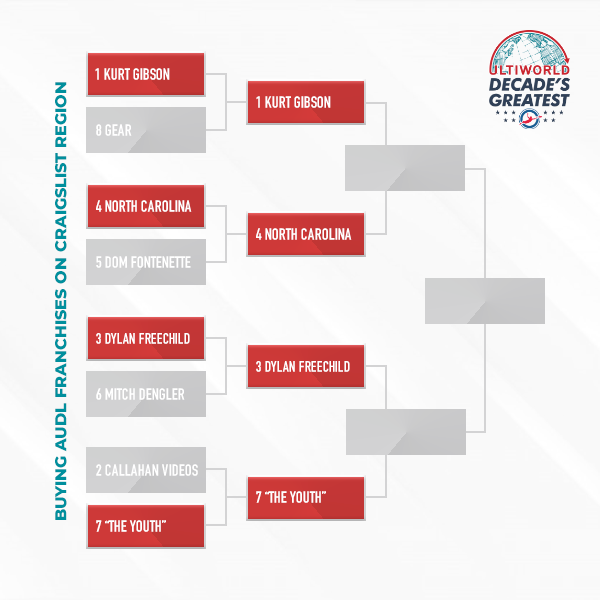
#1 Kurt Gibson vs. #4 North Carolina
Kurt Gibson could have found himself facing a tougher challenge if this was all happening a few years in the future, but as of now North Carolina hasn’t done quite enough winning to get past someone whose blood type is victory positive.
The rise of the Triangle area into the clearest rival to Seattle’s development pipeline is one of the stories of the decade, both in terms of the talent being produced and the identifiable style of ultimate being played. But there are still no club or semi-pro titles on the trophy case in the Tarheel state, and despite the triumphs and spectacular defeats that have shaped legends at Chapel Hill, Wilmington, and Raleigh this decade, ultimately the lack of senior-level titles knocks them out here. Watch out for Carolina in the 2020’s version of this bracket, which I can only assume will be downloaded directly into the Amazon CorText™ content module implanted in the base of your brain stem.
Winner: Kurt Gibson
#3 Dylan Freechild vs. #7 “The Youth”
If this were a contest of who had the most satisfying narrative arc this decade, then Dylan Freechild would be the number one overall seed. He went from high school starlet, driving chatter on message boards and at youth tournaments across the West Coast, to national icon pulling down a Callahan award off of ecstatic Twitter and YouTube exposure. He embodied the digital age of ultimate, rocketed into stardom by an explosion of content, suffering and enjoying the benefits of this notoriety in equal measure.
As the internet does, he was torn apart into polemic opposites somehow expected to occupy the same physical body. A tenacious competitor obsessed with winning! But also a spineless choker who folds like moist cardboard in semis! An ambassador of the sport to young players who used his platform to argue against the transition of ultimate into just another sport. A slap who tweeted nonsense like this:
All of the threads of Freechild ultimately spun themselves together at the very end of the decade with Freechild finally winning his first National Championship, captaining the Sockeye team that did it, and being named POTY to boot. The rise and fall and rise and fall and rise of his career ended with a satisfying narrative conclusion.
But while ending the decade neatly helps to paint the rest in rose, this isn’t about satisfying narrative conclusions. It’s about “winning,” and boy did Dylan spend a good chunk of the decade not winning, literally and figuratively. The Youth, however, did a whole lot of winning. As a corollary of the death and taxes couplet, the young will always replace the old. The win of dethroning father time is sort of built into the whole conceit. But this past decade in ultimate, the inexorable march of time seemed particularly rapacious, with young players accelerating the growth curve of stardom.
Young players in 2020 are doing things that the youngsters in 2010 could barely dream of. Investment in youth development and visibility has more athletes starting out younger and with better resources, which is how you get John Randolph leading college nationals in goals and playing on universe point in the semis of club nationals during his freshman year or Kate Lanier and the 2019 Carleton rookie class making otherwise level-headed reporters speak in tongues about their upside. The gravitational center of talent in the sport is getting younger every year, with kids who still need fake IDs becoming centerpieces of elite club teams.
Freechild himself represents the domination of Youth in the 2010s, as he was one of the sport’s biggest stars by the time he was a junior in college and was the only non-senior/fifth year to win the Callahan all decade. But his accomplishments as a fresh face are subsumed into the strength of The Youth as a whole, and he is cast aside like a wizened husk by the greedy jaws of time, as we all will be.
Winner: “The Youth”
Round 3
UNC Wilmington Texting Scandal Region
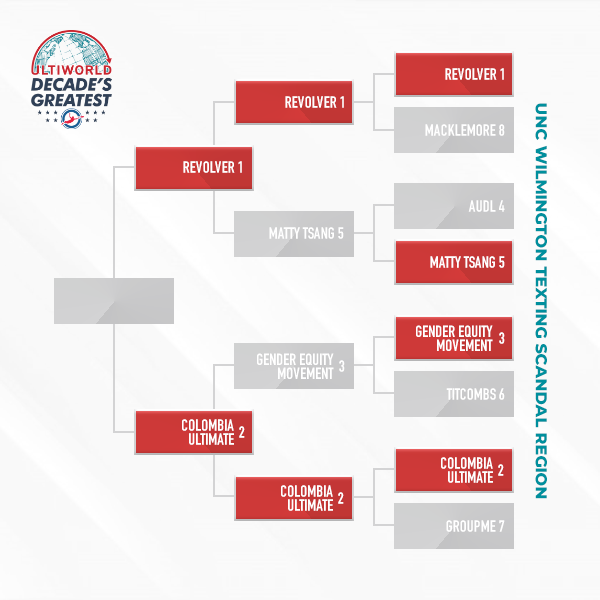
It’s the quarterfinals/regional finals and there is no chaff left to separate. It’s just Clash of the Titans from here on out.
#1 Revolver vs. #2 Colombia Ultimate
Revolver has done more pure winning on the field than anyone else this decade, and if that were the sole metric then this bracket would be a whole lot easier to write. But Colombia Ultimate has increased their standing in the world by unprecedented leaps and bounds, produced some of the game’s most exciting new stars, and has done a fair share of actual winning as well. It’s two different ways to win, as Revolver’s whole reason for being is to win games of ultimate, which they succeeded at spectacularly over the course of the decade. Colombia’s winning this decade was less strictly about titles and more about gains made in terms of development, reputation, and generally getting closer to chasing down the American dreadnought.
Both of these nouns have displayed plenty of winning over the past ten years, so let’s talk about losing for a second. The losses that Colombia sustained this decade are part of their process of winning — roadblocks built into the long game of success. Revolver, however, suffered a loss so destabilizing that it may have changed the very nature of the program forever. The destruction they suffered at the hands of PoNY in 2018 left the team defrocked. It wasn’t that the emperor never had clothes, the clothes were just clawed off his back and he was forced to wander alone naked in the desert.
What is an armadillo without its shell? Is it still an armadillo or something else, something broken?
Revolver had lost games before 2018, but never like that. Never in a way that rejected the entire value proposition of their existence. Revolver doesn’t get embarrassed like that. Revolver got embarrassed by PoNY. Thus, Revolver was not Revolver. The loss stripped them bare.
Perhaps Revolver will recover one day to become what it once was. Perhaps the next decade will bring more titles, more winning, and a resumption of the dynasty and the thousand-year reign of Revolver. But as we ended the 2010s, the thing that was Revolver was Revolver no more. And while that doesn’t undo all of the winning and the success that the team accomplished, it does permanently alter the history of the team and the legacy of the program.
Revolver was disassembled practically, conceptually, and spiritually. That is the kind of loss that impacts one’s status as a winner, a loss that is too big to ignore, and a loss that knocks Revolver out of this bracket.
Winner: Colombia Ultimate
Language Penalties at Nationals Region
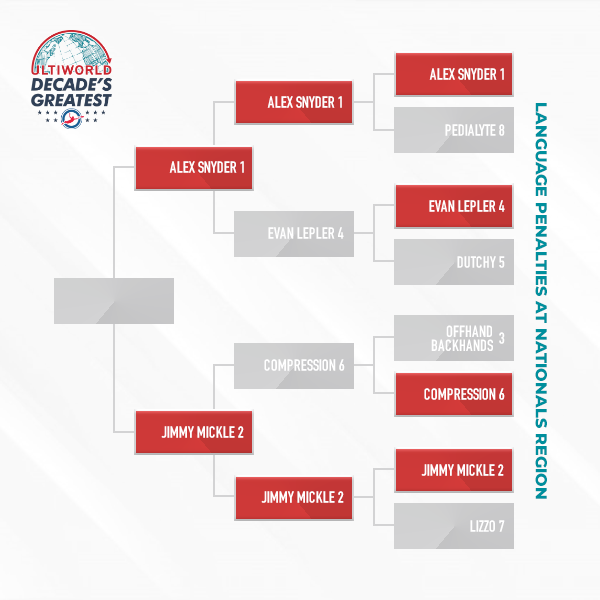
#1 Alex Snyder vs. #2 Jimmy Mickle
This matchup pits longevity of success against dominant peaks. Alex Snyder was one of the six or seven best players in the women’s division pretty much every year she played this decade, winning Offensive Player of the Year in 2017 at age 34, which is a staggering level of consistent excellence. She won five club titles and multiple international golds. The resume is impeccable.
Jimmy Mickle, on the other hand, had more up-and-down years, but probably the highest peaks of any player in the decade. In 2014, he created “the Mickle,” winning college nationals, club nationals, and the Callahan award in the same year. In 2016, he carried a Johnny Bravo team that had no business being anywhere near ESPN to the semifinals. In 2018, he had perhaps the most dominant year of any player ever, returning from his Australian sojourn with a buccaneering Colony team to come two points short of winning the first WUCC gold for a non-American team since 2006, then obliterating the club division en route to a unanimous POTY season and second club championship with PoNY.
But there were valleys on the other side of these peaks, notably in 2017 and 2019. From a competitive standpoint, it’s borderline shocking that a player as talented as Mickle in his prime couldn’t even get near the second team for All Club, but there’s no getting around that he’s had some disappointing years by his own stratospheric standards.
Snyder’s consistency worked against her in terms of individual accolades many years: it was never a hot story to write about how good she was. But while younger, exciting new names were getting ink, she kept on winning and winning and winning. She made semifinals every year from 2010-2018, missing out in 2019 only because she retired from Fury. Every year, we looked for someone else to be the top handler in the country, and every year she kept throwing around backhands and carving up defenses in the wind, and then at the end of the season, we would shrug and say “well yeah, I mean of course Snyder is great.” Her peaks may not have been as high as Mickle’s, but keeping herself at the top of the game year in and year out for as long as she did was ultimately more impressive.
Winners: Alex Snyder
SportsCenter Thirst Trap Region
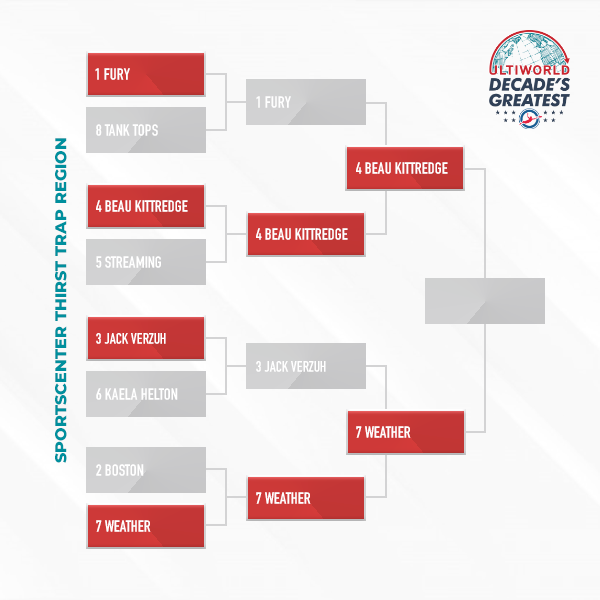
#4 Beau Kittredge vs. #7 Weather
There’s a lot to say about what Beau Kittredge has done to make himself so successful, but let’s not forget the impact he has on others. There’s a reason beyond talent that everywhere he goes, wins follow. He came to PoNY in 2018 and the entire roster gushed about how great of a teammate he was. In 2016 on the Roughnecks, he basically fat-shamed Mickle into being the best player on the planet, so give him some credit for Mickle’s success that season.
But as impressive as Beau was, as dedicated as he was to winning against both his opponents and the very concept of time, he can’t defeat nature itself. Weather is going on to the semifinals.
Let’s revisit the 2015 Pro Flight Finale, shall we?

There is not one lie buried anywhere in there. But for a slightly higher level of fidelity, let’s look at some actual footage of the event:
That weekend was a trial of faith for the people who survived it. People talk about it like early 20th century Christians coming to terms with evolution or Brazilians anytime their national soccer team loses. How can you continue to believe in something that is so fundamentally deconstructed? How can you unsee something when it’s rendered barren and bereft?
Wind has long been the nemesis of ultimate, whether you are trying to produce a compelling spectator product or trying to convince orientation week freshmen to stick around and learn how to throw a flick. And while there are other obstacles and foes that the sport encounters at every turn, none raise the same deep, existential quandaries as when it’s really, really, really goddamn windy.
There is more to weather than wind, which will be explored in the semifinal matchup, but the body count that wind has piled up at every level of the sport over the past ten years is too much for even Beau to box jump over.
Winner: Weather
Buying AUDL Franchises on Craigslist Region
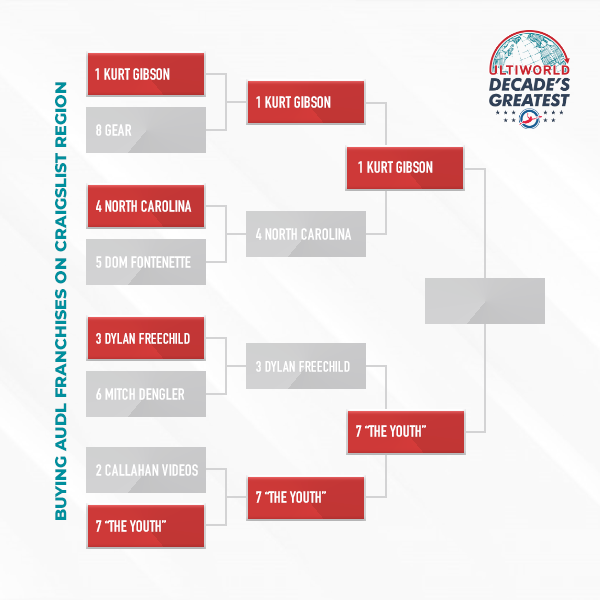
#1 Kurt Gibson vs. #7 “The Youth”
Father time is undefeated. The young always replace the old. And yet…
Kurt Gibson, in year 34 of his life, is still giving all comers both sides of these hands. He was the best player at Nationals in 2019, putting challengers both new and old to the sword. Spry youngsters who couldn’t tie their shoelaces when Kurt first won a college title got dunked on by Gibson, and his own peers didn’t fare any better.
After a decade of watching the two titans go blow-for-blow in championship games, it was sobering to see Beau gamely try to cover Kurt as the life drained out of PoNY’s season. A once proud knight getting his throat slit by one of the assorted nihilists on Game of Thrones. Kurt seems to have struck a bargain with time, exempt from its own ravages so that he can go about collecting souls on its behalf.
And look, absent any actual Faustian bargain, The Youth will eventually win this battle. Perhaps around 45 or 50, Kurt will lose a step going upline and a college junior from Ohio State or Stanford will be the man who shot Jesse James. But it didn’t happen this decade.
Winner: Kurt Gibson
***
Here’s where things stand after crowning regional champs:
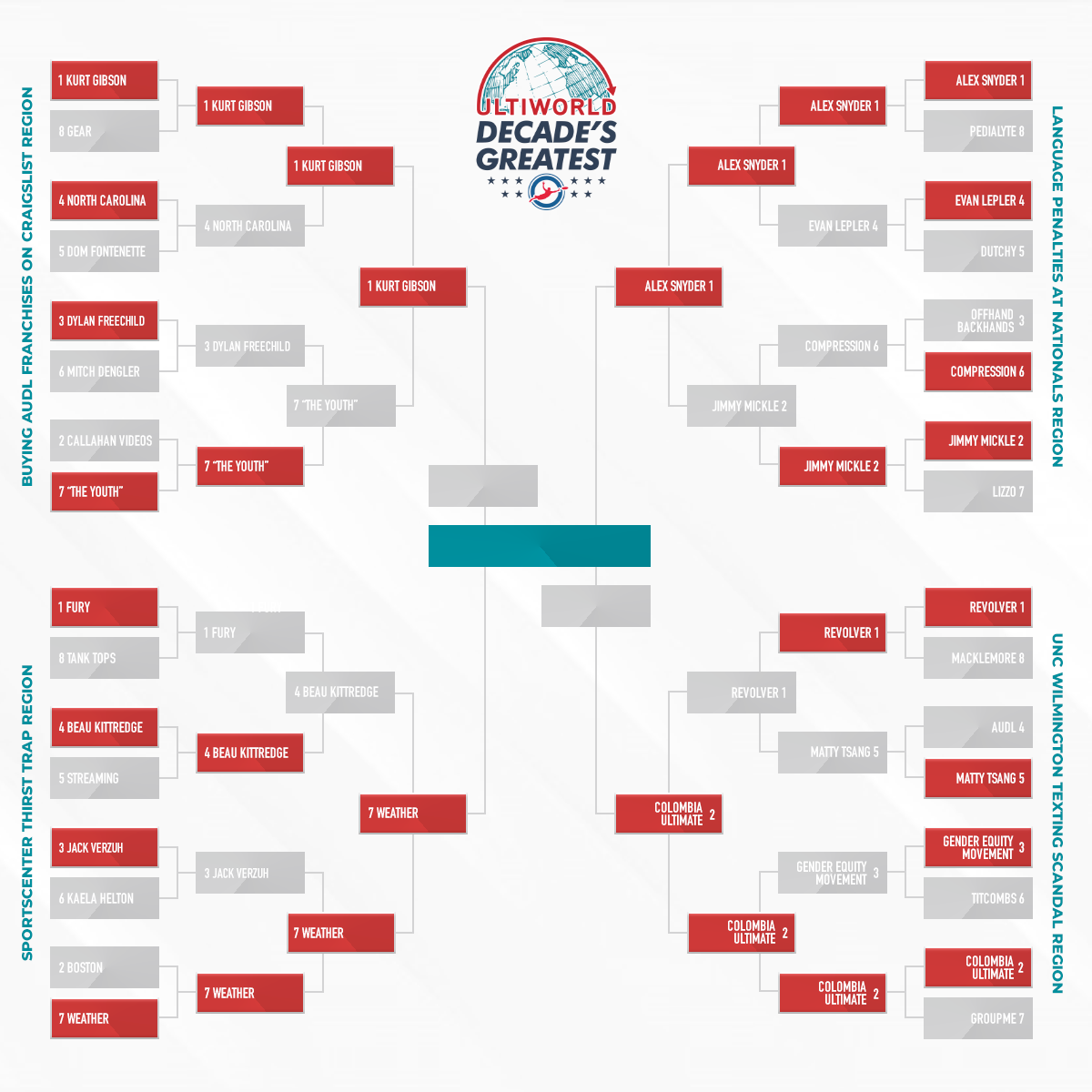
The final four will play out in the series finale next week!